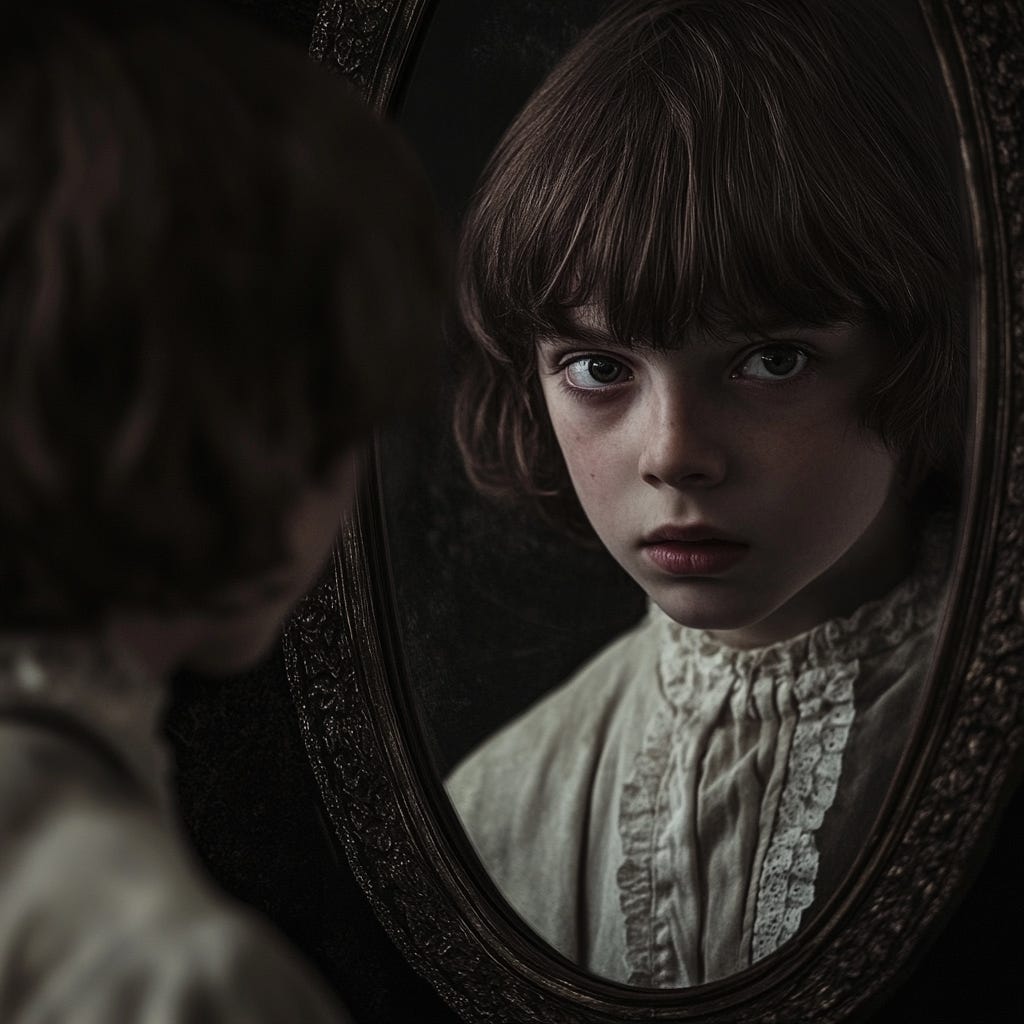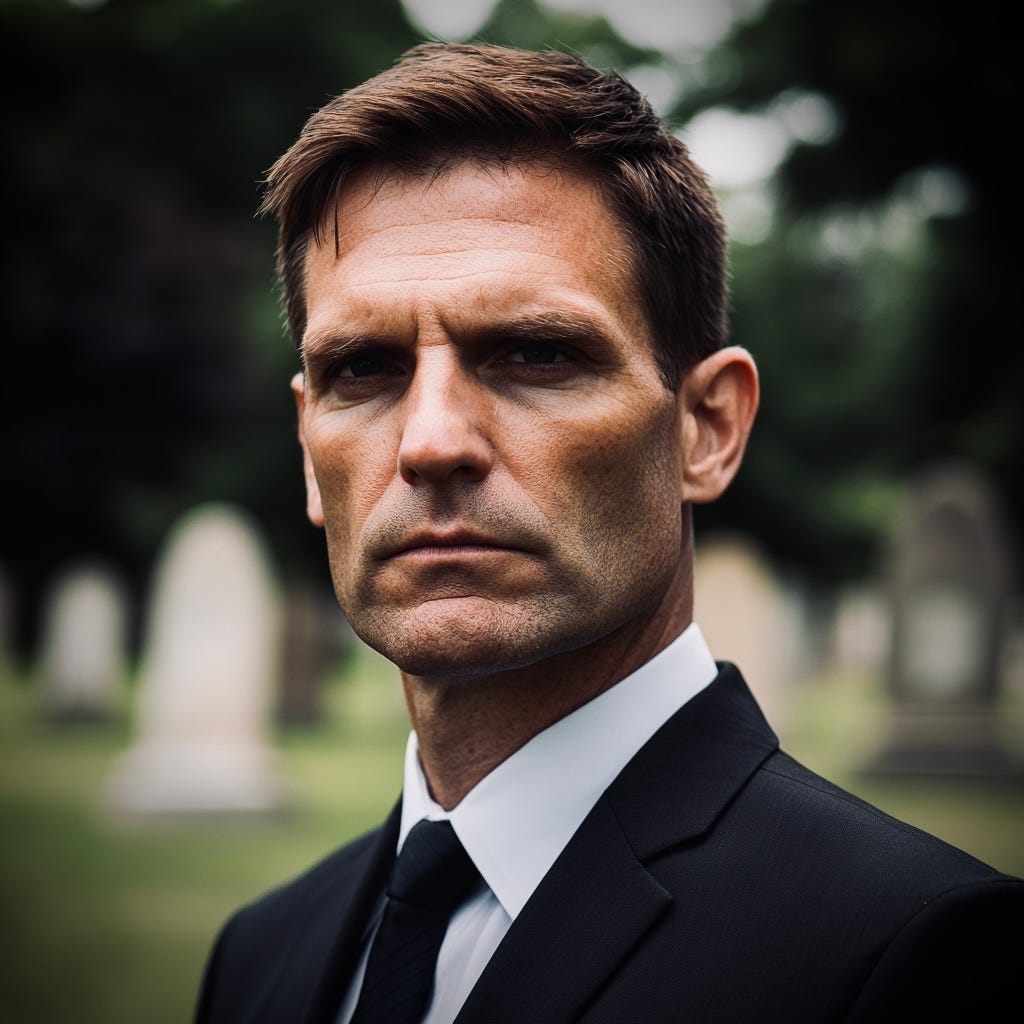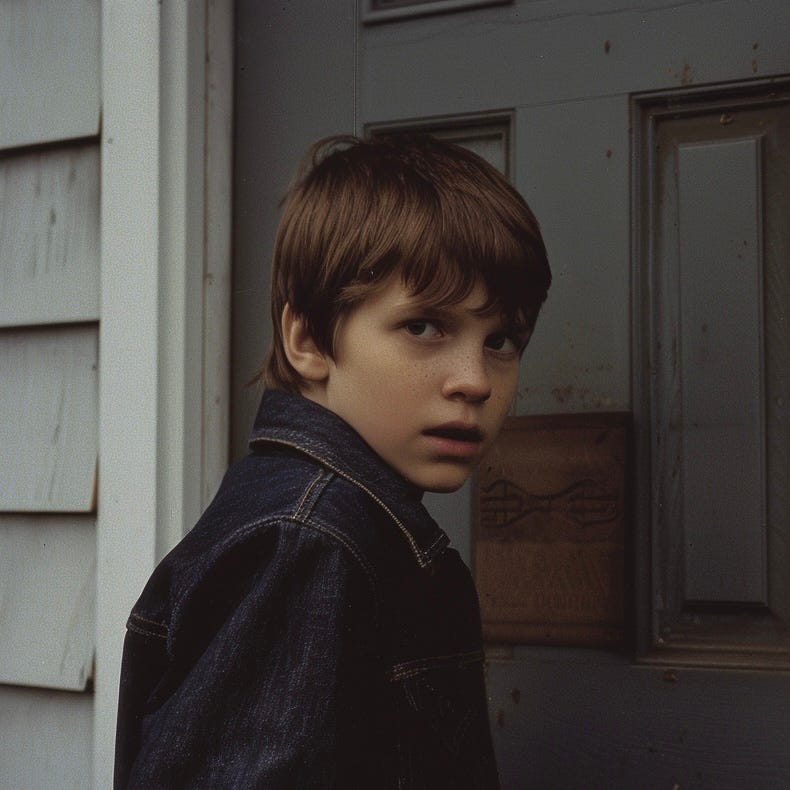“How would you like to live in Looking-Glass House?”
(Through the Looking-Glass and What Alice Found There by Lewis Carroll)
Without a Shadow of a Doubt
For the record: The vile predator who raised me “by hand” never so much as laid a lascivious one on me. When I was a child, I spake as a child, I understood as a child, I thought as a child. But even while still a tender Pauline child, I had begun to put away childish things. (Selah) For I stood in a glass, darkly, like a pert Little Lord Fauntleroy (one arm akimbo), gazing down from the oeil-de-boeuf window of my imaginary tenement upon a world that gazed back up at me—a world that saw me not as I am (ego sum qui sum), but as I chose to be seen. Mirror, Mirror on the wall. . .
That morning I intentionally “forgot” to take the 24-hour-relief fast-acting Claritin tablet, as I sat in the back of the black sedan tailgating the hearse, because I knew that once we arrived at that hee-haw Hoosier cemetery on the outskirts of Somewhere, Indiana, the humid May air would be so thick with cottonwood pollen, that my nose would run, my eyes would puff up; and the other mourners present would think me devastated by the death of that son-of-a-bitch we were laying to rest, the dead pederast I had called my father.
The ruse worked. Amid my snufflings and snifflings came the muffled there-theres spilling from the moist lips of that merry band of tassel-fezzed geezers (Freemasons all), who, less than an hour prior, had executed a bizarre Hiramic rite in the pastelled interior of that podunk funeral parlor, with an aproned Poobah officiating. He began with a solemn invocation to Jachin and Boaz (the brazen pillars flanking the entrance to Solomon’s Temple) before launching into a scripted sermon that ended with a less-than-scripted litany of the alleged virtues of the dead lecher in the casket, whose smiling visage had already begun to take on the polymeric sheen of a ghastly Pez dispenser.
How I loathed those alte cockers (supposed friends of my father), whose flaccid farting bodies milled about the perfumed showroom with its hackneyed copy of Dürer’s Praying Hands mounted over the guest register; and a veritable menstrual flow of nondenominational dirges issuing from a decades-old Casio, played by a purblind biddy who inadvertently activated the foxtrot tempo for a solid seven seconds, as I endeavored straight-facedly to find my assigned seat (pretentiously name-tagged) upon which lay the pearl-gray program.
At last, we stood around the rectangular pit that was to swallow up the pine coffin—we few, we happy few, we band of brothers (not a dame in sight), all of us sweating and fidgeting in our Sunday britches, like the extras in an avant garde film that ends with a nonsensical circle-jerk in a sylvan glade (set to the tune of Pachelbel’s Canon in D Major). I released my pent-up mirth in an orgasm of mucilaginous ructations, tastefully concealed behind a silken kerchief drenched in snot. To clinch the scene, I fell to my knees (anaphylactic head bowed) in a tableau of heart-wrenching despair.
As I did this, I was no longer there at Cedar Lawn Cemetery (conspicuously devoid of cedars), but standing at the foggy crossroads where time and stray recollections intersect—an April afternoon in 1982, the day that I learned I lived under the thrall of a thing more fell than any peopling the oh-so-grim pages of those oh-so-Grimm brothers.
When I was growing up, my father had seemed in my enamored eyes to be an obelisk of humility and decency, a soft-speaking Ward Cleaver of Cold War paternalism. He was my sweet Pappy; my stupid slack-jawed chum. He and I lived alone in a clapboard rambler with asphalt shingles and a gauche determination to flaunt its Midwestern respectability. I have no memory of my mother, who died when I was a baby of causes both “natural” and “mysterious” (something to do with a swimming pool and chronic narcolepsy).
On the afternoon in question, I returned home from school, having forgotten my latchkey on the kitchen counter under the torn wrapper of a brace of Pop-Tarts I had eaten in haste and untoasted before dashing out the door to catch my bus. Within seconds of selfsame bus depositing me at the end of the blacktop drive, the first drops of an imminent storm dribbled down the waterproofing of my denim jacket.
I crossed the street and rang the neighbors’ doorbell. A conversation died within as the door swung open.
I asked the frowning woman who answered if I could wait inside until my father returned at 5:00. (I had never spoken to her before.) The unease in the harridan’s eyes was palpable. I had caught her in an embarrassing situation—knickers down (so to speak). But, like the comic bawd in a Vaudeville show, the blousy “mamma” ushered me in with a wiggle and a giggle and a sidelong glance. I’ve written “mamma” between bosom-squeezing quotation marks, since her ham-handed efforts to appear maternal made it obvious she was inexperienced in such mummery (with all the pun implies).
She led me straight to the den, where the bespectacled patriarch (electrician) pretended to clean an antique camera. Scores of similar apparatus filled the melamine shelves on the walls. A vitrine from Service Merchandise displayed a variety of ancient telescopes, some of which were made of brass and others sheathed in leather. (Actually, none was sheathed in leather, but I could not resist the temptation of an iambic-heptametrical grace note.)
There were photographs in dime-store frames that showed the progression through life of a pigtailed daughter (not present), who attended a Montessori school close by “and don’t mix with the kids round here.” (Also sprach Mammathustra.)
It was then I noticed the picture window. It faced our own, but was furnished with Levolor blinds adjusted in such a way so as to permit these strangers to look into our den during Papa’s nightly watchings of the nightly news (since he kept all of our curtains flung wide to the walls like an exhibitionist); but we could not look into their dwelling. By this I surmised that our “neighbors” were, in fact, government agents, and that their “daughter” was an accessory to an elaborate stakeout whose dark purpose I was only then beginning to fathom.
Without a shadow of a doubt, my father lay under a cloud of suspicion.
For the next two hours, the “electrician” showed off his collection of antique “cameras” and “telescopes”. I turned each over in my hands (like a pawnbroker mulling a counteroffer) and concluded that they were actually state-of-the-art surveillance devices straight out of an Ian Fleming novel. If I could but find the hidden release, I would be gobsmacked by Q Branch’s ingenuity.
“Gotta go!” I said when Daddy’s Chevy pulled up the drive. “Thanks a bunch! Oh, and rest assured: I shan’t divulge to another soul what I have learned this day.”
They glanced at each other significantly. For they had caught my drift.
That summer our “neighbors” moved out in vans disguised as U-Hauls; and a fresh ersatz family moved in, this time with two chubby brothers (twins), who were coincidentally only one year younger than I, which meant they would be attending my school when the fall semester began. The Peeping-Tom jalousies, however, remained in place during this transition period, confirming what I already knew: The lessees of the property could be switcherood and were fungible; but the lessor of was an anonymous state actor.
In an effort to elicit information from the identical gumdrops, I slipped an envelope into the dented mailbox containing a message addressed to the “parents”:
I would like to invite the Weebles you call sons over to my house, so that the three of us can “have fun” and “make crafts” in my cinderblock basement. I have Twinkies galore and a fridge full of Fanta. As we work on our projects, I WILL SHARE WITH THEM ALL THAT I KNOW as I regale them with “sad stories of the death of kings.”
To demonstrate my creativity—and showcase the kinds of art projects I had in mind (should my tubby friends come over)—I cut the individual letters of the invitation out of magazines and affixed these one by one to the paper with Elmer’s glue.
But the “parents” (better trained than the previous crop) directed their “sons” not to associate with me.
But during my final year in middle school, I cornered the twins in the cafeteria, sitting alone beneath an abstract mural allegorizing The Four Food Groups. They chatted amiably over their half-pints of 2% milk; but at my approach, they paled and grew reserved. I stood over them, gripping my tray between immaculate hands, which I scrub at least thirty-five times each day while fervently praying to God to anoint them in the blood of my enemies.
“Decoys,” I said. “You were sent as decoys to entice you-know-whom. I’ve read up on the likes of him and know all about their nasty proclivities. But you must understand that he is careful. I have scoured every inch of our house but can find no evidence that he has committed these offenses. But the absence of evidence is itself a kind of proof. Nicht wahr?”
—Silence.
“Tell your ‘parents’ . . .” I said with a sly wink. “You know, the adults running the investigation? Tell them I shall cooperate with them to the best of my ability. For I wish nothing more than to see this monster trembling in the dock before the cold glare of the Law.”
They played dumb, gaping at each other in simulated stupefaction.
Then they rose in unison and carried their trays to the conveyor belt, where our dirty dishes disappeared into a steaming maul of maniacally clanging cutlery. I fixed them with a baleful stare. Away they slunk to their classmates, who stood at the exit, backs to the wall, like condemned revolutionaries about to be shot. Eventually, the asthmatic gym coach emerged from the smoke-filled teacher’s lounge and led them back to Home Room.
There’s really much more to tell. You’ve probably guessed by now that I killed my father. “Ha ha!” as the villain says. But was a villain ever more justified?
This internal monologue—which I have been mentally composing to while away the time as we wind up the funeral proceedings—is being written down by that Little Lord Fauntleroy who crouches over his desk, taking dictation from his mirror image, who stands even now in that Lewis Carroll looking-glass that doubles as a tenement window.
“Our narrative,” I tell the boys (whose subliminal voices are always in my mind), “is coming to an end. But we don’t know whether to continue it in the past or present tense, due to this troubling turn of events.”
“It’s all her fault,” the two boys affirm univocally.
They are talking about my wife.
How did I meet her? It’s a long story, but I shall tell it briefly.
I joined the Navy after high-school and spent months aboard an aircraft carrier, ass-smacking my way into lifelong friendships with buff frisky seamen, and getting myself involved in the kinds of sudsy antics soap-dropping lads in their late teens and early twenties are prone to. After my enlistment, I enrolled in a state college, where I became a founder member of a Christian association devoted to combating the vice of homosexuality.
I graduated summa cum laude and was awarded a full-ride scholarship to an Ivy League University, where I obtained a pointless PhD in the Classics. When I realized no gains were to be gotten (ill or otherwise) in my narrow field of research (Cosmetics in the Antonine Period), I hightailed it out of academia and rebranded myself as a database programmer. I made millions at time when the Internet was only just beginning to strut her stuff.
While working for a now defunct Dot Com in Chicago, I met her, the love of my life, an obese drab whose ridiculous bisyllabic name I shan’t repeat here, since doing so might (in theory) betray her trailer-trash origins. I refused to meet her parents on the grounds that I already had a family replete with unlettered rubes and was not inclined to be on cordial terms with another. We eloped and moved to Gstaad, so that I could manage my portfolio of illicit offshore accounts in peace. We have no children (since I’ve always found the physical act of getting them revolting); and keep no pets (since I’m allergic to most things feathered, hoofed and dander-shedding).
“I think it tragic,” my wife confessed to me, “that you have no relationship with your father. Open up to me, my love. What is the cause of this coldness that has settled in between the two of you?”—My wife does not speak like a Restoration heroine but has a nasally twang and is overfond of homespun proverbs that grate on my nerves.
But, gentle reader, here’s the kicker. My wife appeared at the graveside. Out of nowhere.—Poof! Like a stage Mephistopheles.
The Freemasons moved off to the side (respectfully) so that she and I could grieve in private.
“What the fuck are you doing here?” I snarled.
“Babes, how come you didn’t tell me your dad was so close to dyin’?”
“Because it wasn’t important. He’s been in hospice for months. Then two nights ago, he stopped breathing.” When I suffocated him.
“You been gone a month. You don’t return my calls. You don’t answer my messages. It’s got me so scared, Babes. I feel like somethin’s goin’ on I need to know about!”
“My God, you sound like a confabulating schizophrenic.”
“And then there’s this young blond fella with dimples and lip gloss—cute as a button. He keeps stoppin’ by the house. I think his name’s Jack—”
“Jacques. What about him?”
“He says he works at that ski resort you exercise at but he ain’t seen ya in the sauna in weeks.”
“I forbid you to speak to him.”
“Why?”
“He’s trying to inveigle me into a lifetime membership.”
“Why would he come to the house for that?”
“Because he’s insane. A foot-in-the-door flim-flam man.”
She seized my cheeks between her greasy mitts. “Sweetie, your eyes are all swolled shut. Did you take your Claritin?”
“How did you get here?”
“I rented a car in Indy.”
“Where are you staying?”
“With mom’s friend.”
“What?”
“Mom has a friend who lives here. They’ve knowed each other since back in the ’80s when we lived here.”
“You never told me you were from Somewhere.”
“You never asked. Besides, I ain’t actually from Somewhere. We only lived here a year. I hardly remember the place. I went to a Montessori school, but hated it so much, mom and dad pulled me out when the year ended and we moved away.”
The scales fell from my eyes. For now we see in a glass, darkly. But then face to face. Now I know in part. But then shall I know, even as also I am known. The faceless ones running the investigation had never been interested in my father. They had been after me all along. How could I have been so blind? And now my sweet father lay dead.
Will all Neptune’s ocean wash this blood free from my hands?
My accusers stand in the mirror of my mind (those two Little Lord Fauntleroys, side by side in the oeil-de-boeuf window of that imaginary tenement), glaring down on me from on high. They see me not as I choose to be seen (the hero of this tale), but as I am: a damnable patricide.
I looked at my “wife” as if seeing her for the first time. The tears rolling down my cheeks are genuine. “How would you like to live in Looking-Glass House?” I ask.
“Babes, half the time I have no idea what you’re talkin’ about. But when I see you sad like this, it breaks my heart. I love ya. Do ya hear me? I love ya more than anything in this world.”
She folds me into her flabby arms, as the Freemasons weep and gravely nod. I squeeze her until I feel the blood of atonement coursing through her sclerotic veins. Once we return to Switzerland, I shall expiate my sins by shedding it.








I consider myself of a collector of unusual words, and I have been collecting since 2018, yet I found four in this story I’ve never even seen before. What an astounding story: funny, unique, expertly crafted.
“A scripted sermon that ended with a less-than-scripted litany of the alleged virtues of the dead lecher in the casket, whose smiling visage had already begun to take on the polymeric sheen of a ghastly Pez dispenser.”
Wonderfully written as always, Daniel, but what a great line this is. Absolutely brilliant 👍🏼